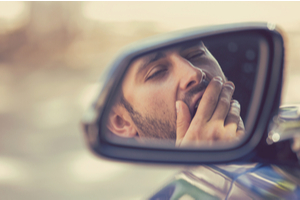 Medical health professionals have raised concerns about the sleep practices of many people in the United States. Simply put, a large number of people do not get enough sleep, or they may not get good-quality sleep that allows them to fully rest and ensure that they can function properly during the day. This is not just a quality-of-life issue that affects people’s health. A lack of proper sleep increases the likelihood of drowsy driving, which can lead to dangerous car accidents. Driver fatigue is especially dangerous for commercial drivers, and it is a common cause of truck accidents that may cause serious or fatal injuries to others.
Medical health professionals have raised concerns about the sleep practices of many people in the United States. Simply put, a large number of people do not get enough sleep, or they may not get good-quality sleep that allows them to fully rest and ensure that they can function properly during the day. This is not just a quality-of-life issue that affects people’s health. A lack of proper sleep increases the likelihood of drowsy driving, which can lead to dangerous car accidents. Driver fatigue is especially dangerous for commercial drivers, and it is a common cause of truck accidents that may cause serious or fatal injuries to others.
Causes of Drowsy Driving
Sleep experts recommend that everyone get at least seven to eight hours of sleep every night. Without sufficient sleep, a person will struggle to concentrate on daily tasks, and this can affect their ability to pay attention to the road when driving. Fatigue will also increase a person’s reaction times, and a delayed response to the movements of other vehicles, pedestrians, bicyclists, obstacles in the road, traffic signals, or other issues may make it impossible to avoid a collision. Drowsiness can also lead to “microsleep” in which a person closes their eyes or falls asleep for a few seconds, and when a person is behind the wheel, this can have deadly results.
Some common reasons for fatigue and drowsy driving include:
- Poor sleep habits – Staying up too late, using electronic devices in bed, eating large meals before going to bed, or other forms of poor “sleep hygiene” can affect people’s ability to get enough sleep, causing them to be fatigued during the day.
- Alcohol use – Many people believe that an alcoholic drink before bed will help them get to sleep. However, this can prevent a person from receiving deep sleep, and they may wake up when the effects of alcohol wear off. Ultimately, this practice can prevent a person from receiving sufficient rest while sleeping.
- Sleep disorders – People who suffer from sleep apnea may be unable to get enough rest during the night. Issues such as snoring, wheezing, waking up repeatedly during the night, or difficulty falling asleep will affect the quality of a person’s sleep, leading to fatigue throughout the day, including while driving.
- Medications – Certain types of medicines can make a person drowsy. These may include over-the-counter cough, cold, and flu medications, as well as multiple types of prescription drugs. Drivers should be aware of the effects that different medications can have on their ability to drive safely.
- Reliance on caffeine – Those who experience fatigue or drowsiness in the morning or throughout the day may drink coffee, soda, or other caffeinated beverages in order to stay awake. However, this does not actually provide a person with extra energy or alertness, and they may still become drowsy while behind the wheel.
- Long trips – People who spend multiple hours behind the wheel are more likely to become fatigued, affecting their ability to drive safely. This can be a significant issue for truck drivers who drive hundreds of miles on a daily basis.
- Driving at night – After dark, a person is more likely to become drowsy while they are driving, and this can combine with issues such as limited visibility to make accidents more likely.
Contact Our Appleton Drowsy Driving Car Accident Lawyers
The lawyers of Herrling Clark Law Firm, Ltd. understand the dangers of drowsy driving, and we work to help accident victims pursue compensation from negligent drivers who got behind the wheel when they were unable to drive safely. To learn how we can help with your case, contact our Green Bay driver fatigue accident attorneys at 920-736-7366 and set up a free consultation today.
Sources:
https://www.nhtsa.gov/risky-driving/drowsy-driving
https://www.cdc.gov/sleep/features/drowsy-driving.html
https://www.nhlbi.nih.gov/resources/brief-your-guide-healthy-sleep


